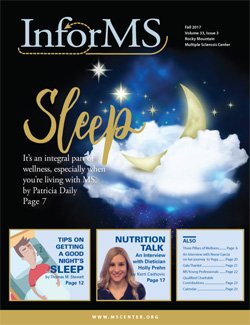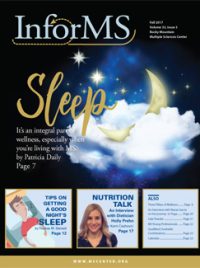
The treatment of multiple sclerosis has changed dramatically in the past 25 years. Although we still don’t understand what causes the disease and can’t repair the damage done by it, we can signiifcantly slow it down. Slowing MS down is important because we now know that the human brain has a tremendous capacity to repair itself and recover from all sorts of damage, given the chance.
For people with MS, giving the brain that chance is a two-pronged process. We need to slow the disease down enough so that the innate repair systems in the brain can catch up, and we need to optimize the functioning of that repair system. So today, the most progressive strategies for treating MS involve the early and continued use of disease-modifying therapies AND the development of lifestyle interventions that encourage brain repair. Enter Wellness Strategies.
Wellness is a term all over the news, but what does it mean? It isn’t the opposite of illness and it isn’t just about your physical body. It is a process of becoming aware of and moving towards those options that encourage health.
Wellness involves a balance of emotional, social, spiritual, intellectual, leisure and physical activities. All of these components are critical for wellness. Sleep, exercise, and nutrition are the three pillars that support physical wellness. Although all interact with and influence each other, many experts believe that sleep is the most critical and underpins the development of the other two.
The importance of understanding the what and how of sleep was highlighted this month when the 2017 Nobel Prize in Medicine or Physiology was awarded to three US scientists for their work on the molecular mechanisms that control our circadian rhythms—critical functions that in fluence our sleep.
This issue of InforMS is focused on sleep, one of the three pillars of wellness, and why it’s important—whether you have MS or not—and on specific sleep issues that often occur when someone does have MS. See this issue’s main article on Sleep. Next up, Tom Stewart offers tips for a better night’s sleep. Nutrition advice can be found in Kerri Cechovic’s interview with registered dietician Holly Prehn. The third pillar, exercise and yoga, have helped Reese Garcia navigate her MS diagnosis.






